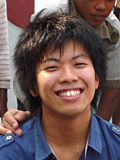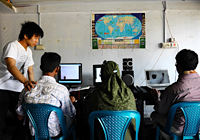
applying imaging technology
Tokyo
Award summary
Supporting advancement to college by high schoolers in rural areas together with Bangladesh and Japanese university students
Mr. Atsuyoshi Saisho's involvement with Bangladesh began in 2009, when he read about the Grameen Bank, which provides unsecured loans to the poor in Bangladesh, in his second year as a university student. Deeply moved by the activities of the Bank, he conceived the desire to work there, and took leave of his studies toward the end of that year and went to Bangladesh. There, he proposed a program of internship at the Bank to allow 100 Japanese university students to get firsthand experience of its work. The Bank recognized his powers of action, and he became the first Japanese national to be hired as a coordinator at the Global Communication Center (GCC), its research laboratory.
Hoping to change Bangladesh with personal computers and IT, Mr. Saisho traveled around the country on a field survey, and in the process learned of the immense educational gaps opened by the serious shortage of teachers. Youth who went on to study at a university were in almost all cases from wealthy homes that could afford prep-school education. In contrast, high schoolers from impoverished rural areas generally had to forget about a college education, however talented they might be. What Mr. Saisho hit upon in his desire to help the latter go on to college was the DVD-based video instruction he himself had received in a cram school. He figured that, as long as a personal computer was available, anyone could obtain advanced instruction by these means. He consequently launched the e-Education Project with the cooperation of university students in both Bangladesh and Japan. He made DVD recordings of the classes (in English, Bengali, and Sociology) of three noted teachers in Dhaka, the capital of Bangladesh, and used them for the first term of instruction from June to November 2010 in the village of Hamchar, a remote hamlet which requires a trip of about four hours by boat and another hour by car to reach from Dhaka. That autumn, almost 20 of the approximately 30 students who took part in the Project passed university entrance exams. Four of them matriculated at the University of Dhaka and two other schools regarded as particularly difficult to enter. The remarkable accomplishment was said to be a miracle and made headlines in Bangladesh. Three students achieved successful academic results by entering competitive schools in the second term as well. For the third term of the Project starting this year, Mr. Saisho is going to make the instruction available at a total of four villages.

Reasons for this award
Mr. Saisho left Japan, exercised his powers of action, achieved results, and gave hope to youth in both countries
In the atmosphere of today, when so many youth appear to be at a loss about which path to choose, it is really wonderful how Mr. Saisho demonstrated such outstanding powers of action and went ahead with his ideas without being bound by conventional perspectives. He achieved results right from the first year, and his activities are a focus of lofty aspiration and hope among not only youth residing in impoverished villages in Bangladesh but also those in Japan.
Comments from the winner
The initial reaction to our e-Education Project was that instruction by DVD in the poorest villages was completely out of the question. While this was the general reaction, Mr. Abdul Sheikh Motlin, a student at the University of Dhaka who was one of the Project partners, believed in the possibilities throughout and pushed the plan ahead with me. I would like to accept the award on the behalf of him and all the high school students who passed the entrance exam at the University of Dhaka, a feat regarded as miraculous in Bangladesh. This year, I want to take up the challenge of a second continent and implement the Project in the African country of Rwanda in addition to Bangladesh. My dream is to get the Project under way in all five continents.






